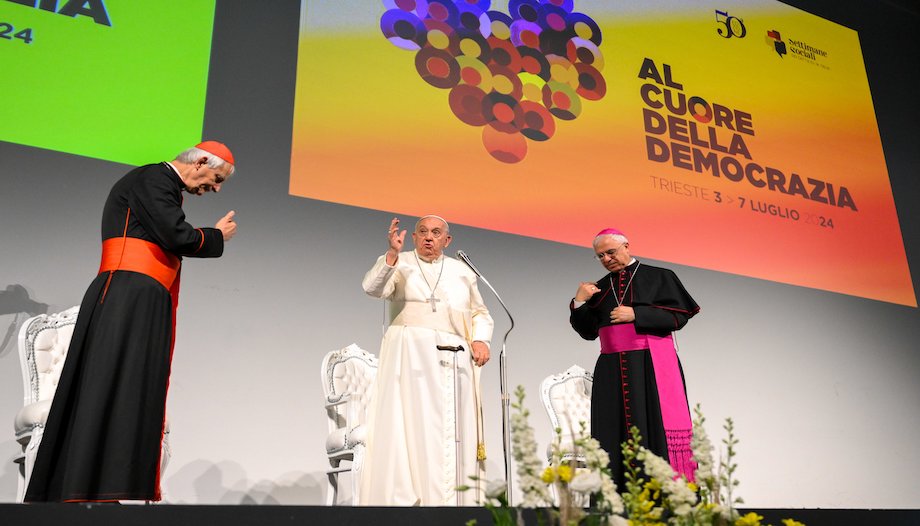On July 7, Pope Francis made a pastoral visit to Triestewhere the Church in Italy had summoned delegates from all over the country to participate in the 50th Social Week of Italian Catholics. He spoke to some ten thousand people, stressing the need for a restored and, above all, participatory democracy.
While the initiative was opened by the President of the Italian Republic, Sergio Mattarella, the closing ceremony was marked by the participation of the Pope. Francis first met at the Trieste Congress Center with the 1,200 delegates who had been discussing the theme of democracy throughout the week, and then celebrated Holy Mass before the more than 8,000 faithful gathered in Piazza Unità d'Italia.
Denouncing corruption, social exclusion and the culture of waste, the Pope urged Christians to an active engagement in public life, which must be rooted in an "incarnate and prophetic" faith. He then stressed the importance of moving from mere attendance at the polls to a more authentic participation, nourished by both creativity and solidarity, in order to build a more just and fraternal society. Indeed, faith must enter into history and heal the wounds of society, thus becoming a leaven of hope and justice.
The crisis of democracy
Before the delegates convened by the Italian Episcopal Conferencewhich has organized the Social Weeks for decades, the Pope highlighted the crisis of modern democracy, comparing it to a "wounded heart".
He went on to reiterate how democratic participation is undermined by corruption, social exclusion and the well-known culture of exclusion. "Every time someone is marginalized, the whole social body suffers. The throwaway culture draws a city where there is no place for the poor, the unborn, the fragile, the sick, children, women, the young, the elderly."
Then, quoting Blessed Giuseppe Toniolo, creator also of the Catholic Social Weeks, the Pontiff described democracy as a civil order in which "all social, juridical and economic forces, in the fullness of their hierarchical development, cooperate proportionately for the common good, reverting in the final result to the prevailing benefit of the lower classes". This concept highlights how a healthy democracy must aspire to the common good, especially for the benefit of the weaker classes.
The responsibility of Christians
The Pope also stressed the responsibility of Christians in social transformations, calling for an active and at the same time critical, formative and participatory commitment from the earliest age. At this point he referred to another Italian politician, Aldo Moro, who affirmed that "a State is not truly democratic if it is not at the service of man, if it does not have as its supreme goal the dignity, freedom and autonomy of the human person".
Hence the call to restore the heart of democracy, through creativity and solidarity: "as long as our economic and social system continues to produce only one victim and there is only one discarded, universal fraternity cannot be celebrated", he added.
A restless faith
In his homily, however, the Pope recalled the experience of Jesus and the prophets, who were often rejected and considered a source of scandal because of the way they treated their communities. The Pope then criticized consumerism and indifference, calling them a "plague" and a "cancer" because they sicken the heart and make people selfish.
The solution, rather, is to live a restless faith that puts its finger on the wounds of society and becomes a leaven of hope. "We need the scandal of faith, a faith rooted in the God who became man and, therefore, a human faith, a faith of flesh, which enters into history, which caresses the lives of people, which heals broken hearts."
Building a civilization of fraternity
Finally, addressing the Triestine community, but with a projection that concerns all people of good will, the Pontiff stressed the importance of not being scandalized by Jesus, but of being indignant in the face of situations of degradation and suffering: "Let us carry in our flesh the prophecy of the Gospel, with our choices rather than with words.
Therefore, a restored and participatory democracy is only possible - summing up the Holy Father's vision - through an incarnated and prophetic faith, capable of facing social and political challenges with courage and creativity. In this way it also becomes a source of life and hope for the entire human community.
Social weeks
The Social Weeks were born in 1907 on the initiative of Blessed Giuseppe Toniolo, a Catholic economist and sociologist. Since their creation, they have provided a forum in which Catholics can discuss the main problems of society and identify proposals and strategies to promote the common good.








